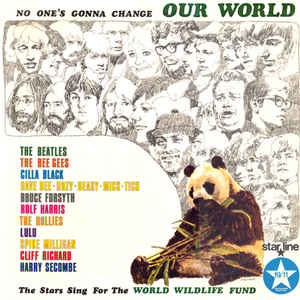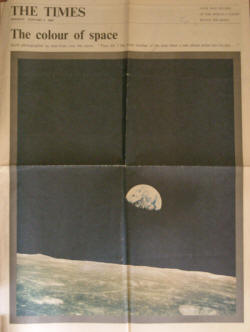“Subconscious sabotage.”
To his death, that remained John Lennon’s reflection on the recording of “Across the Universe,” what he regarded as one of his finest sets of lyrics.
Here’s John quoted in All We Are Saying, David Sheff’s full transcription of his September 1980 Playboy interview:
But the Beatles didn’t make a good record of Across the Universe. I think subconsciously sometimes we — I say “we,” though I think Paul did it more than the rest of us; Paul would … sort of subconsciously try and destroy a great song.
He subconsciously tried to destroy songs, meaning that we’d play experimental games with my great pieces, like “Strawberry Fields” — which I always felt was badly recorded. That song got away with it and it worked. But usually we’d spend hours doing little detailed cleaning-ups of Paul’s songs; when it came to mine, especially if it was a great song like “Strawberry Fields” or “Across the Universe,” somehow this atmosphere of looseness and casualness and experimentation would creep in. Subconscious sabotage. He’ll deny it, ‘cause he’s got a bland face and he’ll say the sabotage doesn’t exist. But this is the kind of thing I’m talking about, where I was always seeing what was going on … I begin to think, Well, maybe I’m paranoid. But it’s not paranoid; it’s absolute truth.
The same thing happened to “Across the Universe” It was a lousy track of a great song and I was so disappointed by it. It never went out as the Beatles; I gave it to the Wildlife Fund of Great Britain, and then when Phil Spector was brought in to produce Let It Be, he dug it out of the Beatles files and overdubbed it. The guitars are out of tune and I’m singing out of tune ‘cause I’m psychologically destroyed and nobody’s supporting me or helping me with it and the song was never done properly.
By January 1969, “Across the Universe” was completely in the can — even down to the sound effects, which the group heard for the first time on the January 7 (George Harrison wasn’t crazy about the birds). With a dearth of fresh material, John could have made “Across the Universe” a focal point during the Get Back sessions. This was John’s chance to properly record the year-old song to his ears.
But like previous occasions at Twickenham, he wouldn’t show much passion to rehearse and rejuvenate the song. Still, “Across the Universe” remained and returned to the table January 9 as the group continued to develop new and manage more established songs for an eventual live show as the sessions began its second week.
“Across the Unicorn,” as John introduced it that day, was performed at such a glacial pace in an initial take that it broke down seconds in with laughter from John. “It shouldn’t be that slow, should it?” As a reaction, the group — as they’d often do — zipped through the song double-time after another standard attempt.
While the song was fully formed, “Across the Universe” wasn’t stage-ready. George didn’t like the birds on wax, and he didn’t like the harmony with Paul as performed at Twickenham. The interplay between George and the others on this fact should sound familiar. Really, nothing was going to change his world.
John: What didn’t you like about his har-MO-ney?
George: Just in some places.
John: Ah, some places. Well that’s details, George.
Paul: Please specify then, please specify.
George: (after singing singing the first verse), It sounds a bit forced .. It wasn’t natural.
Paul: Especially in the “Nothing’s going to change my world.”
John: Just sing that in unison.
Paul: I was planning on working on those bits anyway.
Ah yes, the bland-faced saboteur was prepared to do his worst.
Continuing to work on the song, George and Paul attempted painfully high top harmonies on “jai guru deva,” prompting John to respond, “Is that a bit much?”
With additional takes, the harmonies developed into a characteristically lovely John-Paul-George blend — it’s hard for those three voices together to sound anything but — even if the rest of the song’s redevelopment remained stagnant, at best.
“The ‘nothing’s gonna change my world’ — we got to do something to it,” John said, giving Ringo some rare (for these sessions) drumming instruction — asking for “something heavier. Just play an on-beat there. Try doing the on-beat on the snare, to push it along.”
Not significantly improved and with just a single complete take over nearly 15 minutes of work on “Across the Universe,” John was clearly uninspired by his own song, asking, “Should we do something else then?”
Paul rejected the thought, suggesting they again speed things up. A subsequent attempt indeed had a little more pep — the rhythm section didn’t drag quite as much as it had, additional lead guitar licks peppered the chorus and Paul added more extensive harmonies throughout the song. Again, the song wasn’t completed to its finish, but George wasn’t displeased overall, admitting it was a “little better that time.”
John didn’t bother to offer his own review, instead breathlessly launching into a brief improvisation that has since gone by the name “Shakin’ in the Sixties.” The group followed with an upbeat cover of Cliff Richards’ 1958 hit “Move It” that in turn spilled into a sloppy but jubilant abbreviated version of “Good Rockin’ Tonight.”
An animated discussion of “Rowan & Martin’s Laugh-In” — the group were all clearly fans, trading lines from the show (”Very interesting …” “Say goodnight, Dick”) — led to something of a comic take of Carl Perkins’ “Tennessee,” with everyone enjoying playing.
(It’s nice to know: They may have been the greatest band on the face of the earth, but they still talked about TV at work, just like we do).
Ready to shift gears back to business, John asked, “Have we learned any new ones lately?” After a deliberately flippant butchering of the first verse of “Across the Universe,” John said, “I don’t want to do that one anymore.”
As George began to play “I Me Mine” — a new one from just the day before — John instead sang the words to “House of the Rising Sun.” They never do play “I Me Mine,” instead launching into a series of racially charged songs addressed at length in the last post.
“Across the Universe” and “I Me Mine,” ultimately back-to-back tracks on Side 1 of Let It Be, share another piece of history: By this moment on the afternoon of January 9, 1969, both songs were completely abandoned, weeks before the end of the January 1969 sessions.
“I Me Mine” was recorded from scratch in 1970 by the Threetles, while “Across the Universe” saw its original 1968 recording … embellished and warped by Phil Spector, John’s choice to produce the final soundtrack album. That’s two songs on the Let It Be LP taken not from its associated sessions, but appearing on the record purely because of the songs’ appearance in the Let It Be film.
But while George eventually took his opportunity to properly record “I Me Mine” in the final recording session before the Beatles broke up, what of John’s “Across the Universe”? While unplayed after January 9, 1969 , the song was listed among the the possible numbers for a live show on January 21, the group’s first day of sessions at Savile Row after George left on January 10 and the rest of the Beatles took a hiatus after January 14. But when George asked if they should consider and rehearse “Across the Universe” on January 23, John passed.
“No, no, ’cause it’s going out on an EP,” John said.

Ode to a panda bear: “Across the Universe” debuted on the “No One’s Gonna Change Our World” charity LP in December 1969.
This opens up some questions. Circa some point in 1968, “Across the Universe” was tabbed for the World Wildlife Fund’s charity LP — that’s why the birds were recently overdubbed, for use on that record. But we also know — or think we know — there was a potential Yellow Submarine EP at one point considered, and that would have included the original version of “Across the Universe.” But if that was the case, it would have been profoundly strange that the other Beatles wouldn’t have been aware of it. An odd unicorn, indeed.
But the song’s eventual release wasn’t necessarily of consequence. If John wanted a new version of his song for posterity, this was the time to craft it on his terms. The Beatles resurrected “One After 909,” after all, and breathed life into a song that had a truly bland recording gathering dust in the vault.
While it wasn’t confirmed in any way, there were certainly some occasional discussions by this early point that these sessions could easily yield a new album, in addition to serving as rehearsals for a live show. Stuck for a month, John could have rehearsed and re-calibrated the absolute daylights out of “Across the Universe.” Lord knows Paul played the hell out of “Get Back” and his songs during the sessions. But here we are on January 9, 1969, and “Across the Universe” was completely discarded, both as an option for the live show but also as a song to be revisited and rerecorded. Who sabotaged whom? Or even what?
Maybe our sources aren’t really reliable after all. Here’s John in January 1971, from his iconic “Lennon Remembers” interview in Rolling Stone:
You know, we all say a lot of things when we don’t know what we’re talking about. I’m probably doing it now, I don’t know what I say. You see, everybody takes you up on the words you said, and I’m just a guy that people ask all about things, and I blab off and some of it makes sense and some of it is bullshit and some of it’s lies and some of it is – God knows what I’m saying.
Needless to say, this issue hangs over pretty much every corner of Beatles scholarship. At least John had the self-awareness to admit this, as problematic a fact it is.
So was the original recording of “Across the Universe” a victim of “subconscious sabotage”? Regardless of the answer, John — who we can certainly believe was never satisfied with any of the recordings of the song, even the one he helped record with David Bowie in 1975 — had the blank palate of the January 1969 sessions to craft it in any direction he pleased. But he was bored with the song, whether he would admit it or not, and took it no further after just a week into the sessions, despite a paucity of new material.
The song as recorded would be released, as planned, in December 1969 on the World Wildlife Fund’s “No One’s Gonna Change Our World” LP with John’s voice sped up, and again in May 1970 on Let It Be, further adorned and with his voice slowed down.
Subsequent official releases of “Across the Universe” came in 1996 (Anthology 2), 2003 (Let It Be … Naked) and 2018 (White Album deluxe release). Each of those stripped down versions came after John’s death and with Paul’s presumptive partial oversight.
And every recorded version of the Beatles’ “Across The Universe” was sourced from the original recordings from early February 1968.





